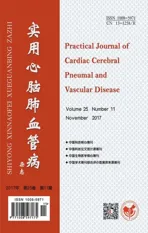ST段抬高型心肌梗死患者心理问题及心理护理干预的效果分析
2018-01-05张海波黄正林邹礼华
吴 鹏,张海波,任 平,李 琛,龙 毅,黄正林,邹礼华
·护理工作研究·
ST段抬高型心肌梗死患者心理问题及心理护理干预的效果分析
吴 鹏,张海波,任 平,李 琛,龙 毅,黄正林,邹礼华
目的分析ST段抬高型心肌梗死(STEMI)患者心理问题及心理护理干预效果。方法选取雅安市人民医院2014年1月—2016年1月收治的急性心肌梗死(AMI)患者188例,根据梗死类型分为非ST段抬高型心肌梗死(NSTEMI)组102例和STEMI组86例,采用随机数字表法将STEMI患者分为对照组42例和干预组44例。所有患者行经桡动脉或股动脉经皮冠状动介入治疗(PCI)及常规药物治疗,干预组患者在此基础上给予心理护理干预。比较NSTEMI组和STEMI患者症状自评量表(SCL-90)评分;比较对照组和干预组患者干预前、干预6个月后抑郁自评量表(SDS)评分、焦虑自评量表(SAS)评分、健康调查简表(SF-36)评分。结果STEMI组患者躯体化评分、强迫评分、人际关系评分、抑郁评分、焦虑评分、敌对评分、恐惧评分、偏执评分、精神病性评分高于NSTEMI组(P<0.05)。干预前两组患者SDS评分、SAS评分比较,差异无统计学意义(P>0.05);干预6个月后干预组患者SDS评分、SAS评分低于对照组(P<0.05)。干预前两组患者身体功能评分、总体健康评分、活力评分、精神健康评分、社会功能评分、生理职能评分、身体疼痛评分、情感职能评分比较,差异无统计学意义(P>0.05);干预6个月后干预组患者身体功能评分、总体健康评分、活力评分、精神健康评分、社会功能评分、生理职能评分、身体疼痛评分、情感职能评分高于对照组(P<0.05)。结论与NSTEMI患者相比,STEMI患者心理问题较为突出;心理护理干预可有效减轻STEMI患者抑郁和焦虑情绪,改善患者生活质量及预后。
心肌梗死;心理干预护理;治疗结果
ST段抬高型心肌梗死(STEMT)是冠心病(coronary heart disease,CHD)的严重类型,由于其病死率及并发症发生率较高,故已成为全球范围内重大公共卫生问题之一[1-2]。目前,经皮冠状动脉介入治疗(percutaneous coronary intervention,PCI)是STEMT最有效的治疗手段,其可降低患者病死率[3]。既往研究发现,CHD患者面临许多心理问题,其中30%~72%患者存在抑郁症状,40%~65%患者存在焦虑症状[4-5]。若CHD患者心理问题未得到有效干预,不仅会促使疾病复发或恶化,还可增加医疗费用支出,但目前有关行PCI的STEMT患者是否伴有更严重心理问题尚未明确[6]。本研究旨在分析STEMT患者心理问题及心理护理干预效果,为有效提高患者预后提供参考,现报道如下。
1 资料与方法
1.1 诊断标准和排除标准 STEMI诊断标准[3]:(1)持续胸痛≥30 min;(2)心电图检查发现新发生的左束支传导阻滞或相邻2个或2个以上导联ST段抬高≥0.1 mV;(3)心肌损伤标志物动态升高。排除标准:(1)最近有重大手术、创伤、颅内肿瘤者;(2)有严重出血或出血性疾病者;(3)既往有认知障碍或精神病史者;(4)不愿参加测评者;(5)非首次行PCI者。
1.2 一般资料 选取雅安市人民医院2014年1月—2016年1月收治的急性心肌梗死(AMI)患者188例,均符合AMI诊断标准。根据梗死类型将所有患者分为非ST段抬高型心肌梗死(NSTEMI)组102例和STEMI组86例;采用随机数字表法将STEMI患者分为对照组(42例)和干预组(46例)。NSTEMI组与STEMI组、对照组与干预组患者性别、年龄、吸烟史、高血压发生率、糖尿病发生率、冠心病家族史比较,差异均无统计学意义(P>0.05,见表1、2),具有可比性。
表1 NSTEMI组与STEMI组患者一般资料比较
Table1 Comparison of general information between NSTEMI group and STEMI group

组别例数性别(男/女)年龄(x±s,岁)吸烟史〔n(%)〕高血压〔n(%)〕糖尿病〔n(%)〕冠心病家族史〔n(%)〕NSTEMI组10265/3764 8±8 873(71 6)34(33 3)23(22 5)8(7 8)STEMI组 86 58/2867 7±8 162(72 1)32(37 2)25(29 1)5(5 8)χ2(t)值0 2851 597a0 0060 3081 0430 298P值0 6460 1141 0000 6460 3190 774
注:a为t值;NSTEMI=非ST段抬高型心肌梗死,STEMI=ST段抬高型心肌梗死
表2 对照组和干预组患者一般资料比较
Table2 Comparison of general information between control group and intervention group

组别例数性别(男/女)年龄(x±s,岁)吸烟史〔n(%)〕高血压〔n(%)〕糖尿病〔n(%)〕冠心病家族史〔n(%)〕对照组4230/1266 6±8 532(76 2)15(35 7)13(31 0)2(4 8)干预组4428/1668 7±7 630(68 2)17(38 6)12(27 3)3(6 8)χ2(t)值0 5941 170a0 6850 0790 1410 166P值0 4950 2490 4750 8260 8131 000
注:a为t值
1.3 治疗方法 根据《2014 ACC/AHA非ST段抬高型急性冠脉综合征诊治指南》,NSTEMI为低危疾病,行经桡动脉或股动脉择期PCI;STEMT为高危疾病,行经桡动脉或股动脉急诊PCI。常规治疗药物包括阿司匹林肠溶片、硫酸氢氯吡格雷片、血管紧张素转换酶抑制剂(ACEI)或血管紧张素Ⅱ受体拮抗剂(ARB)、β-受体阻滞剂及阿托伐他汀钙片等。
1.4 心理护理干预 干预组患者在上述治疗基础上给予心理护理干预,包括:(1)摄入性会谈:患者入院后24 h内由心理咨询师收集患者相关资料,包括一般情况(如情绪、性格特征、行为特点等)、生活习惯、主要临床症状、家庭经济状况等。在整个过程中心理咨询师应态度热情,理解、尊重、关心患者,以建立良好的医患关系,并帮助患者制定生活目标。(2)心理辅导:发放CHD健康资料(如手册、图片等),每两周组织患者参加CHD健康讲座,解答患者提出的各种问题,并让患者相互交流,以发挥患者的角色榜样作用。鼓励患者建立健康的生活方式,纠正不良行为、错误认知等。(3)心理咨询和健康指导:每月开展1次心理咨询和健康指导活动,鼓励患者说出内心感受,耐心倾听、适当询问和指导,以理解的态度回应患者感受,围绕患者不适和相关症状开展相应的心理咨询和健康指导,以帮助患者解决心理问题。
1.5 观察指标 (1)采用症状自评量表(SCL-90)评分评估NSTEMI组和STEMI组患者的心理状态,评分越高表明患者心理问题越严重。(2)采用抑郁自评量表(SDS)与焦虑自评量表(SAS)评分评估两组患者干预前和干预6个月后焦虑与抑郁情况,评分越高表明患者抑郁与焦虑程度越严重。(3)采用健康调查简表(SF-36)评分评估两组患者干预前和干预6个月后生活质量,评分越高表明患者生活质量越好。所有测评均在患者病情稳定后进行。

2 结果
2.1 SCL-90评分 STEMI组患者躯体化评分、强迫评分、人际关系评分、抑郁评分、焦虑评分、敌对评分、恐惧评分、偏执评分、精神病性评分高于NSTEMI组,差异有统计学意义(P<0.05,见表3)。

表3 NSTEMI组和STEMI组患者SCL-90评分比较分)
2.2 SDS评分、SAS评分 干预前两组患者SDS评分、SAS评分比较,差异无统计学意义(P>0.05);干预6个月后干预组患者SDS评分、SAS评分低于对照组,差异有统计学意义(P<0.05,见表4)。

Table4 Comparison of SDS score and SAS score between two groups before and after intervention

组别例数SDS评分SAS评分干预前干预6个月后干预前干预6个月后对照组4254 39±7 8051 56±10 1654 50±8 5453 14±8 94干预组4455 00±7 1344 92±10 9153 97±8 1346 14±6 14t值0 7433 1500 4603 944P值0 4630 0030 649<0 001
注:SDS=抑郁自评量表,SAS=焦虑自评量表
2.3 SF-36评分 干预前两组患者身体功能评分、总体健康评分、活力评分、精神健康评分、社会功能评分、生理职能评分、身体疼痛评分、情感职能评分比较,差异无统计学意义(P>0.05);干预6个月后干预组患者身体功能评分、总体健康评分、活力评分、精神健康评分、社会功能评分、生理职能评分、身体疼痛评分、情感职能评分高于对照组,差异有统计学意义(P<0.05,见表5)。

表5 两组患者干预前后SF-36评分比较分)
3 讨论
STEMT是CHD的严重类型,具有起病急、病情严重等特点,若治疗不及时会导致患者预后较差。近年来随着医疗和科学技术发展,STEMT的诊断及治疗已逐渐完善,但患者的心理问题尚未受到临床重视。近期有研究结果显示,我国CHD患者抑郁症患病率约为51.0%,其中3.1%~11.2%的患者为重度抑郁症[7]。既往研究结果显示,抑郁症是CHD患者预后不良的危险因素[8-9];此外,抑郁症还可增加CHD患者心肌梗死发生风险[10-11]。WATKINS等[8]研究结果显示,焦虑并抑郁会严重影响CHD患者预后。因此,缓解焦虑、抑郁情绪对提高CHD患者预后具有重要意义。
既往研究结果显示,PCI可有效改善CHD患者临床症状、降低病死率及提高患者生活质量[12]。ZHANG等[13]研究结果显示,接受PCI的CHD患者部分出现情感障碍,主要表现为焦虑、抑郁。分析CHD患者PCI后出现心理问题的原因可能如下[14-15]:(1)缺乏CHD相关知识;(2)缺乏介入手术的相关知识;(3)对手术过程不了解。本研究结果显示,STEMT组患者躯体化评分、抑郁评分、强迫评分、人际关系评分、抑郁评分、焦虑评分、敌对评分、恐惧评分、偏执评分、精神病性评分高于NSTEMI组,提示行急诊PCI的STEMT患者抑郁和焦虑程度重于行择期PCI的NSTEMI患者,分析其原因可能为STEMT起病急,患者因对疾病缺乏认识而常出现紧张、烦躁、忧虑、恐惧等不良情绪;再者,因病情紧急医务人员与患者及其家属缺乏交流、沟通,进一步增加患者心理负担。因此,加强社会宣传和教育,提高人们对CHD(特别是AMI)的认识,了解疾病发病过程、手术过程可能减少STEMT患者心理问题。
大量临床研究结果显示,抑郁可增加CHD患者近期病死率,降低患者生活质量[16-17]。本研究结果显示,干预6个月后干预组患者SDS评分、SAS评分低于对照组,提示心理护理干预可有效改善STEMT患者抑郁、焦虑情绪。本研究结果还显示,干预6个月后干预组患者身体功能评分、总体健康评分、活力评分、精神健康评分、社会功能评分、生理职能评分、身体疼痛评分、情感职能评分高于对照组,提示心理护理干预可有效提高STEMT患者生活质量及改善患者预后。
综上所述,与NSTEMI患者相比,STEMT患者心理问题较严重,心理护理干预可有效改善STEMT患者抑郁和焦虑情绪,提高患者生活质量及改善患者预后。
[1]Task force on the management of ST-segment elevation acute myocardial infarction of the European Society of Cardiology(ESC),STEG P G,JAMES S K,et al.ESC Guidelines for the management of acute myocardial infarction in patients presenting with ST-segment elevation[J].Eur Heart J,2012,33(20):2569-2619.DOI:10.1093/eurheartj/ehs215.
[2]American college of emergency physicians,Society for cardiovascular angiography and interventions,O′GARA P T,et al.2013 ACCF/AHA guideline for the management of ST-elevation myocardial infarction:executive summary:a report of the American College of Cardiology Foundation/American Heart Association Task Force on Practice Guidelines[J].J Am Coll Cardiol,2013,61(4):485-510.DOI:10.1016/j.jacc.2012.11.018.
[3]Authors/task force members,WINDECKER S,KOLH P,et al.2014 ESC/EACTS Guidelines on myocardial revascularization:The Task Force on Myocardial Revascularization of the European Society of Cardiology(ESC)and the European Association for Cardio-Thoracic Surgery(EACTS)Developed with the special contribution of the European Association of Percutaneous Cardiovascular Interventions(EAPCI)[J].Eur Heart J,2014,35(37):2541-2619.DOI:10.1093/eurheartj/ehu278.
[4]REID J,SKI C F,THOMPSON D R.Psychological interventions for patients with coronary heart disease and their partners:a systematic review[J].PLoS One,2013,8(9):e73459.DOI:10.1371/journal.pone.0073459.
[5]ZOLFAGHARI M,EYBPOOSH S,HAZRATI M.Effects of therapeutic touch on anxiety,vital signs,and cardiac dysrhythmia in a sample of Iranian women undergoing cardiac catheterization:a quasi-experimental study[J].J Holist Nurs,2012,30(4):225-234.DOI:10.1177/0898010112453325.
[6]TAYLOR-RODGERS E,BATTERHAM P J.Evaluation of an online psychoeducation intervention to promote mental health help seeking attitudes and intentions among young adults:randomised controlled trial[J].J Affect Disord,2014,168:65-71.DOI:10.1016/j.jad.2014.06.047.
[7]REN Y,YANG H,BROWNING C,et al.Prevalence of depression in coronary heart disease in China:a systematic review and meta-analysis[J].Chin Med J(Engl),2014,127(16):2991-2998.
[8]WATKINS L L,KOCH G G,SHERWOOD A,et al.Association of anxiety and depression with all-cause mortality in individuals with coronary heart disease[J].J Am Heart Assoc,2013,2(2):e000068.DOI:10.1161/JAHA.112.000068.
[9]TULLY P J,COSH S M,BAUMEISTER H.The anxious heart in whose mind?A systematic review and meta-regression of factors associated with anxiety disorder diagnosis,treatment and morbidity risk in coronary heart disease[J].J Psychosom Res,2014,77(6):439-448.DOI:10.1016/j.jpsychores.2014.10.001.
[10]BURG M M,MEADOWS J,SHIMBO D,et al.Confluence of depression and acute psychological stress among patients with stable coronary heart disease:effects on myocardial perfusion[J].J Am Heart Assoc,2014,3(6):e000898.DOI:10.1161/JAHA.114.000898.
[11]GAN Y,GONG Y,TONG X,et al.Depression and the risk of coronary heart disease:a meta-analysis of prospective cohort studies[J].BMC Psychiatry,2014,14:371.DOI:10.1186/s12888-014-0371-z.
[12]SERRUYS P W,MORICE M C,KAPPETEIN A P,et al.Percutaneous coronary intervention versus coronary-artery bypass grafting for severe coronary artery disease[J].N Engl J Med,2009,360(10):961-972.DOI:10.1056/NEJMoa0804626.
[13]ZHANG P.Study of Anxiety/Depression in Patients with Coronary Heart Disease After Percutaneous Coronary Intervention[J].Cell Biochem Biophys,2015,72(2):503-507.DOI:10.1007/s12013-014-0495-2.
[14]ARTHUR H M,SMITH K M,NATARAJAN M K.Quality of life at referral predicts outcome of elective coronary artery angiogram[J].Int J Cardiol,2008,126(1):32-36.DOI:10.1016/j.ijcard.2007.03.111.
[15]TAYLOR-PILIAE R E,MOLASSIOTIS A.An exploration of the relationships between uncertainty,psychological distress and type of coping strategy among Chinese men after cardiac catheterization[J].J Adv Nurs,2001,33(1):79-88.
[16]DENOLLET J,MARTENS E J,SMITH O R,et al.Efficient assessment of depressive symptoms and their prognostic value in myocardial infarction patients[J].J Affect Disord,2010,120(1/3):105-111.DOI:10.1016/j.jad.2009.04.013.
[17]SOLORIO M R,ROSENTHAL D,MILBURN N G,et al.Predictors of sexual risk behaviors among newly homeless youth:a longitudinal study[J].J Adolesc Health,2008,42(4):401-409.DOI:10.1016/j.jadohealth.2007.09.023.
[18]PEDERSEN S S,DENOLLET J,DAEMEN J,et al.Fatigue,depressive symptoms,and hopelessness as predictors of adverse clinical events following percutaneous coronary intervention with paclitaxel-eluting stents[J].J Psychosom Res,2007,62(4):455-461.DOI:10.1016/j.jpsychores.2006.12.018.
PsychologicalStatusinPatientswithST-segmentElevationMyocardialInfarctionandtheEffectofPsychologicalNursingIntervention
WUPeng,ZHANGHai-bo,RENPing,LIChen,LONGYi,HUANGZheng-lin,ZOULi-hua
DepartmentofCardiology,thePeople′sHospitalofYaan,Yaan625000,China
ObjectiveTo analyze the psychological status in patients with ST-segment elevation myocardial infarction and the effect of psychological nursing intervention.MethodsA total of 188 patients with acute myocardial infarction were selected in the People′s Hospital of Yaan from January 2014 to January 2016,and they were divided into A group(with non ST-segment elevation myocardial infarction,n=102)and B group(with ST-segment elevation myocardial infarction,n=86)according to infarctions types,and then patients in B group were divided into B1 group(n=42)and B2 group(n=44)according to random number table.All of the 188 patients
transradial approach or transfemoral approach PCI combined with conventional medical treatment,meanwhile patients of B2 group received extra psychological nursing intervention.SCL-90 score was compared between A group and B group;SDS score,SAS score and SF-36 score before intervention and 6 months after intervention were compared between B1 group and B2 group.ResultsSomatization disorder score,obsessive-compulsive symptom score,interpersonal relationship score,depression score,anxiety score,hostility score,fear score,bigotry score and psychoticism score in B group were statistically significantly higher than those in A group(P<0.05).No statistically significant differences of SDS score or SAS score was found between B1 group and B2 group before intervention(P>0.05),while SDS score and SAS score in B2 group were statistically significantly lower than those in B1 group 6 months after intervention(P<0.05).No statistically significant differences of physical function score,overall health score,vitality score,mental health score,social function score,role physical score,body pain score or role emotional score was found between B1 group and B2 group before intervention(P>0.05),while physical function score,overall health score,vitality score,mental health score,social function score,role physical score,body pain score and role emotional score in B2 group were statistically significantly higher than those in control group 6 months after intervention(P<0.05).ConclusionCompared with non ST-segment elevation myocardial infarction patients,psychological problems are more prominent in ST-segment elevation myocardial infarction patients;psychological nursing intervention can effectively relieve the depression emotion and anxiety emotion,improve the quality of life and prognosis.
Myocardial infarction;Psychological intervention nursing;Treatment outcome
625000四川省雅安市人民医院心内科
R 542.22
B
10.3969/j.issn.1008-5971.2017.11.029
吴鹏,张海波,任平,等.ST段抬高型心肌梗死患者心理问题及心理护理干预的效果分析[J].实用心脑肺血管病杂志,2017,25(11):103-106.[www.syxnf.net]
WU P,ZHANG H B,REN P,et al.Psychological status in patients with ST-segment elevation myocardial infarction and the effect of psychological nursing intervention[J].Practical Journal of Cardiac Cerebral Pneumal and Vascular Disease,2017,25(11):103-106.
2017-08-15;
2017-11-15)
李伟)
